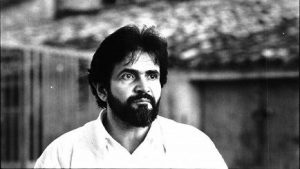
Mauro Rostagno, investigative journalist killed in Sicily. Photo from RaiPlay, “Memorie – Fatti e persone da ricordare”
I’m a humanities student: I study philosophy and Italian. I love words and ideas, books and seminars. As an aspiring academic, I dream of being able to flourish in a highly focused academic setting. That said, I’ve always been interested in putting my skills into practice with research and other opportunities outside of the classroom. As I began my search into how I could translate my interests into action, though, I had a hard time: the practical, material side of the humanities was intimidatingly broad and I did not immediately feel like I was able to narrow my focus enough to fit the descriptions of research projects and other listings. All the while, I had a lot of computer science, economics, and political science friends finding great summer stints doing research of their own.
In this state of feeling like I would not be able to find research where I’d be able to stay in my element while contributing to a real, tangible project, I got lucky. I found a project description on the Undergraduate Research and Fellowships page for an Anthropology professor who needed students versed in Italian to work on Italian-language archives of legal cases over the summer.
I was then a recently declared Italian major, so I applied for the position and requested a letter of recommendation from my Italian professor. After being accepted, I was still a bit hesitant. I did not see Anthropology as being directly related to my fields of study. I had no prior connections to the professor or their work, being unconnected to my major departments. However, I spoke to the professor, whose passion for the project and affability convinced me to take part. They also assured me that the work was able to be done remotely, providing me a great deal of flexibility in allowing me to travel home for the summer while performing my duties to the project. I looked into their previous academic work to get a sense of the aim of the research and communicated frequently with them to make sure we were on the same page regarding my understanding of the milestones and the methods of procedure.
Deciphering the legal cases in Italian archives was fascinating: from murder prosecutions to masonic lodge conspiracies and ties between the Italian mafia and the nation’s governmental bodies, I found myself in a labyrinth of documents and words in a non-native language. The bulk of it, though, surrounded one man’s case: the murder of Mauro Rostagno, an investigative journalist who was killed in Sicily in the 1980’s because of his anti-mafia activity in the prior years.
In the six weeks of doing archive work, I learned a great deal about both Italian language and history, as well as the intrinsic benefits of conducting research in the first place. I never expected to be doing this kind of research over the summer. But then again, I never expected to be majoring in Italian until I took my first class; nor did I imagine that the close relationships I fostered with my language teachers would provide the groundwork for a recommendation letter for a research position. I also did not expect remote research to be feasible for six weeks, but it turned out to be an efficient course of action for us. And of course, I did not know I would be intending to do research at all! All in all, I felt like a series of unexpected turns got me in the perfect spot for circumstances to emerge that allowed me to both explore a new field and use the skills I had burnished thus far. I was able to make a close acquaintance of a passionate professor under the aegis of the work, and, perhaps most importantly, I realized that another area of study—anthropology—might not be a step away from my primary fields of interest at all, but rather a way to approach practicing them.
The work was fascinating, and I feel like I learned a lot. But I believe applying to the position was the most important step in the process—accepting that I might feel like I was in the deep end for a little bit, but then seeing that the mists of other fields could be cleared. My experience demystified the research process and removed many of the hurdles I felt in the attempt to harness my skill set and passions for a worthwhile aim.
